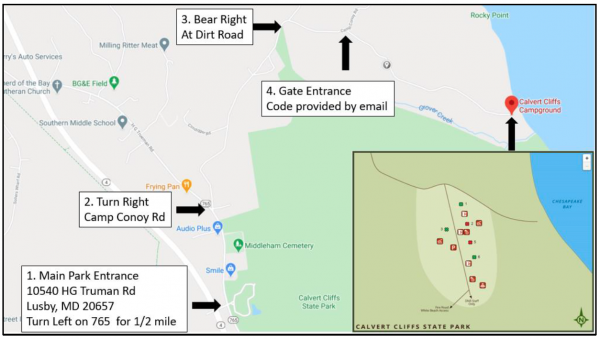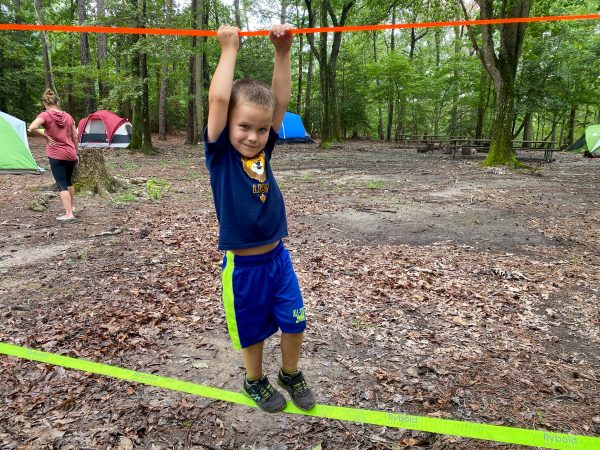This camping trip to Calvert Cliffs was the first time the Pack had camped as a group since the start of the COVID-19 pandemic. Many of our scouts and leaders were anxious for an opportunity to conduct a scout outing as most of our activities since the beginning of the pandemic were virtual. This location was ideally suited for our trip because the private campground area and private beach enabled us to easily social distance from other people. We reserved two campsites to allow our group to spread out a little more than normal and but ended up having the entire camp to ourselves for the weekend.
One of the other main reasons why we selected this park was the prospect of finding shark teeth and other fossils. Unfortunately, that aspect of the trip did not live up to my expectations. I anticipated that it would be much easier than it was to find shark teeth along the beach. In total, our group probably only found about 10 teeth total during a few hours of searching. Additionally, the weather during our stay was a perfect storm to encourage heavy biting fly activity on the beach. We had heavy rain on Friday night and some cloud cover during the day Saturday and the fly’s seemed to love the hot, humid, and cloudy combination. The fly activity was nearly as bad as we experienced when visiting Assateague Island State Park last summer and several scouts and adults were bit hard enough to bleed. If the flies were not as bad, we probably would have enjoyed our time at the beach more than we did. Despite the flies and lack of fossils, most of my scouts seemed pleased with the experience and brought home containers full of interesting shells and interesting stones they found along the beach. If I were to do this again, I would probably buy a bag of shark teeth on the internet before the trip so I could make sure that every scout goes home with at least one.
The other factor that slightly diminished our beach trip was the high presence of vibrio bacteria in the waters of the Chesapeake bay. From my research, it seems that this is typical in this region in the summer months because of all of the runoff that flows into the bay North of the area. Because of the high bacteria and no ability to shower at camp, scouts were discouraged from entering the water. We were extra cautious and had everyone that waded in the water wash their feet and legs with soap and water using the water spigot. In hindsight, it would have been very easy to hook a garden hose up to the spigot to make bathing/showering easier.
We did not enter the main park during our visit but drove past the entrance on our way to and back from the campground. On both instances, the main park was full at capacity and the rangers were turning people away. We were very fortunate to experience nearly the same beach access that the day users got without needing to fight a crowd of people or needing to walk the nearly 4 mile round trip from the parking lot to the beach. The walk to the private beach from the campground was approximately 1/4 mile and 75-100 feet of elevation change along a washed out fire road.
We also did not do any formal group hiking during this trip but there are miles of woods between the campground and the main park that could be explored. Also, when the main park is not as busy (perhaps spring or fall seasons) there are several trails at the park that would be worth checking out including a trail that runs through a large marsh/pond.
Ultimately, the best aspect of this trip was the time spent hanging out at the campground. Our scouts were excited to be outside again and really enjoyed the downtime playing in the wooded areas and taking turns on the slack line. We probably could have easily added more group games and other activities that took advantage of the beautiful private campsite, but the more relaxed nature of this trip worked well for an end of summer campout. The lack of shark teeth was a bit disappointing but the private campground experience made up for it. I would recommend checking this park out again off season when the crowds at the main park are smaller and hopefully the flies are less aggressive.




